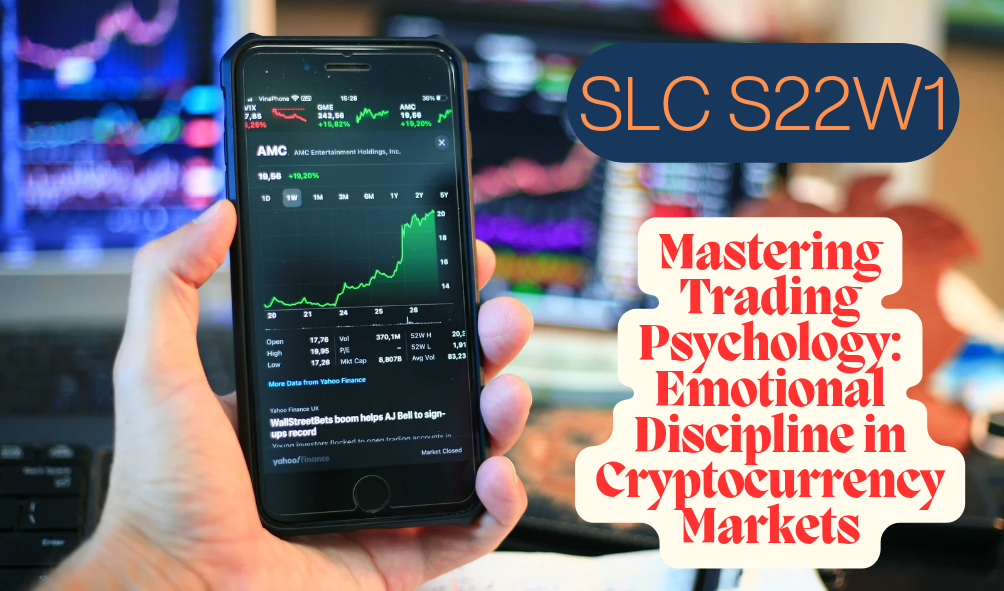Mastering Trading Psychology: Emotional Discipline in Cryptocurrency Markets
3 comments

Assalamu Alaikum Wa Rahmatullah, I hope everyone is well, I am also well by the grace of Alhamdulillah. I will now write a few words related to the topic of this contest. As much as I have an idea about the subject, I will try to give the maximum. I hope everyone will like this post and my expression. So let's get started without delay.

Identifying Emotional Triggers in Trading Discuss common emotional triggers (e.g., fear, greed, overconfidence) that affect traders. Provide examples of how these emotions manifest during market movements.
In trading, emotions such as fear, greed, excessive confidence, etc. have a big impact on traders. If these emotions are not controlled by the businessmen, they have a bad effect on them, such as,
Fear: Fear affects a businessman only when there is a fear of loss in business. For example, suddenly the price of a trader's stock or asset starts to fall rapidly, as a result of which the trader quickly becomes worried and fears the loss and sells the stock at a low price, but for fear he forgets that the price of this stock may increase later, but due to this fear he makes a wrong decision.
Greed: Greed is the cause of human destruction. There should not be excessive greed in trading, because there is a possibility of large losses due to greed. For example, a person buys a stock and the stock exceeds the level of profit, but the trader keeps the stock in the hope of making more profit, but on the contrary, the price of the stock starts to fall and he faces a big loss due to this excessive greed. And for this greed, many traders invest in risky trades, facing problems.
Overconfidence: Overconfidence can cause a big loss to a businessman. When a businessman adopts a method of his own, the business is profitable. Then he became interested in making bigger trades and due to this overconfidence he suffered big losses. Because not everything is done in a certain way, analysis is important for every trade.
FOMO: This is an emotion when a person sees that the trading market is doing well, then he invests out of emotion. Which is surely a wrong decision.
Panic selling: When the market conditions are bad, the trader becomes extra panic. As a result, he sells his stock at a loss, and this is also a wrong decision.
There are some strategies to avoid loss:–
- Emotion Control: All such emotions should be controlled by fear, greed and overconfidence. And it has to be set up that no wrong decision can be made by excessive panic.
Overcoming Psychological Barriers Share techniques to overcome psychological barriers like fear of missing out (FOMO), loss aversion, or overconfidence. Use examples relevant to Steem/USDT trading.
Psychological barriers to trading, such as FOMO, fear, greed, overconfidence, etc., can be prevented by mastering some strategies. With examples of steem/USDT trading, strategies to overcome mental barriers are discussed.
- FOMO: FOMO is a mental condition in which the individual feels that he is depriving himself of all kinds of opportunities. So he makes quick decisions to get those opportunities and he is more likely to be wrong.
For example, when a person sees a price of steam or USDT go from $0.30 to $0.50, he buys it out of greed, at an exorbitant price, but then decreases in value instead of inflation. And the trader suffers losses.
Prevention strategies: Emotion Control: Emotions have to control themselves, if you miss an opportunity, you will think that another good opportunity will come and you have to refrain from making wrong decisions and making hasty decisions.
Loss aversion: Some traders cannot accept small losses resulting in more losses.
For example: A trader bought Steam/USD $0.40 but the stock suddenly fell to 0.32 but he did not accept this small loss and sat in the hope of profit, as a result of which the stock price fell further, the trader suffered a bigger loss.
Prevention Strategies: Emotion Control: - Must have the ability to accept small losses so that they do not have to face big losses.
Stop Loss: Set a stop loss, such as buying 0.40 dollars, setting a limit of 0.35.
Learning from loss: Every loss is a lesson to accept it and move forward.
Overconfidence: Overconfidence increases the chances of loss. When one continues to achieve success, he becomes confident, resulting in decisions without analysis and suffers losses.
For example: a man has profitably succeeded in trading four times in a row, and he overconfidently bought Steam USD at 0.30 dollars, but suddenly the stock price began to fall in the market and the trader suffered large losses.
- Prevention Strategies: Refrain from being overconfident. Decision making through verification and analysis. Refrain from making hasty decisions.
| Some strategies to overcome mental barriers: |
|---|
- Trading Plan: Setting clear goals and limits.
- Emotion control.
Developing a Trading Routine Propose a daily or weekly trading routine that includes psychological preparation, such as journaling trades, setting realistic goals, and practicing mindfulness.
A disciplined routine is very important for trading to run successfully. Below is a weekly and daily trading routine:-
| In the morning:- |
|---|
Like a normal day, you have to start the morning stress-free. After completing physical exercise or yoga, daily work and trading work should begin.
Set aside time for market analysis, goal setting and complete tasks without stress.
Avoid making too many risky decisions.
A separate time should be allocated for work every day and work should not be forced on itself, normal conditions should be maintained in daily life.
| Afternoon:- |
|---|
- You need to note down the details of each trade. For journaling trade, 40 minutes should be allocated in the afternoon.
| Weekly Trade Routine:- |
|---|
- Holidays – You have to completely refrain yourself from work on holidays. And enjoy the holidays on your own.
| Mid-week:- |
|---|
- Review how far you have progressed towards the goal you have set.
| Monday:- |
|---|
- Analyze market trades.
- And set goals.
Case Study on Emotional Trading Analyze a hypothetical or real-life scenario where emotions led to a significant trading mistake. Explain how emotional discipline could have prevented the loss.
| The case study on emotional trading is presented below:- |
|---|
Trader Mamun is new to the stock market, he has learned some basic strategies, and he has profited on several trades at once. And that has made him overconfident. As a result, Mamun took a big trade with the euro / dollar pair, he thought he would be able to profit this time as before. But proving his idea wrong, the market started moving in the opposite direction. And because of this, he suffered a lot of losses.
Emotional reaction:– Seeing this, Trader Mamun became angry at not being able to accept his loss and strengthened his position, he thinks he can make up for this loss. And thinking of this, he put his entire account at risk.
The wrong decision he makes as a result of anger makes his entire account empty at one point.
The main reason for the loss of trader Mamun was emotion, greed, and revenge.
Trader Mamun's mistake was not to set the correct stop loss.
Instead of learning from the loss, take revenge.
Participate in big trades with confidence.
| How to prevent harm through mental discipline: |
|---|
- Setting a stop loss.
- Make a specific trade plan.
- Controlling emotions.
- Journaling.
- Take breaks.
Building Resilience in Volatile Markets Discuss how to build mental resilience to handle high-stress trading environments, including techniques for staying focused during volatile conditions.
Strategies to maintain mental resilience in volatile markets are discussed below:-
| Building Mental Resilience:- |
|---|
- Accepting reality and moving forward, a trader must have the ability to accept reality.
- There will be profit and loss in the trade market and you have to accept it and move forward.
| Emotion Control:- |
|---|
- You have to control your emotions, no matter what the situation is, in that situation
You have to be sure, you can't make the wrong decision.
| Mindfulness: |
|---|
Whatever the situation, you have to keep yourself still.
- Follow a specific plan.
- Make a trading plan.
- Avoid risk in trading.
| Positive Ideas:- |
|---|
- Learning from loss, not retaliating.
- Always keep a positive attitude.
- Mastering different information.

In this great competition, I think everyone has the best. By participating, their talent and creativity can be revealed. There is no harm in participating, but there is a small gain. So I'm inviting some of my friends here. They are.
| Count | My Steemian Friends |
|---|---|
| 1 st | @irawandedy |
| 2nd | @wilmer1998 |
| 3rd | @muzack1 |



Comments